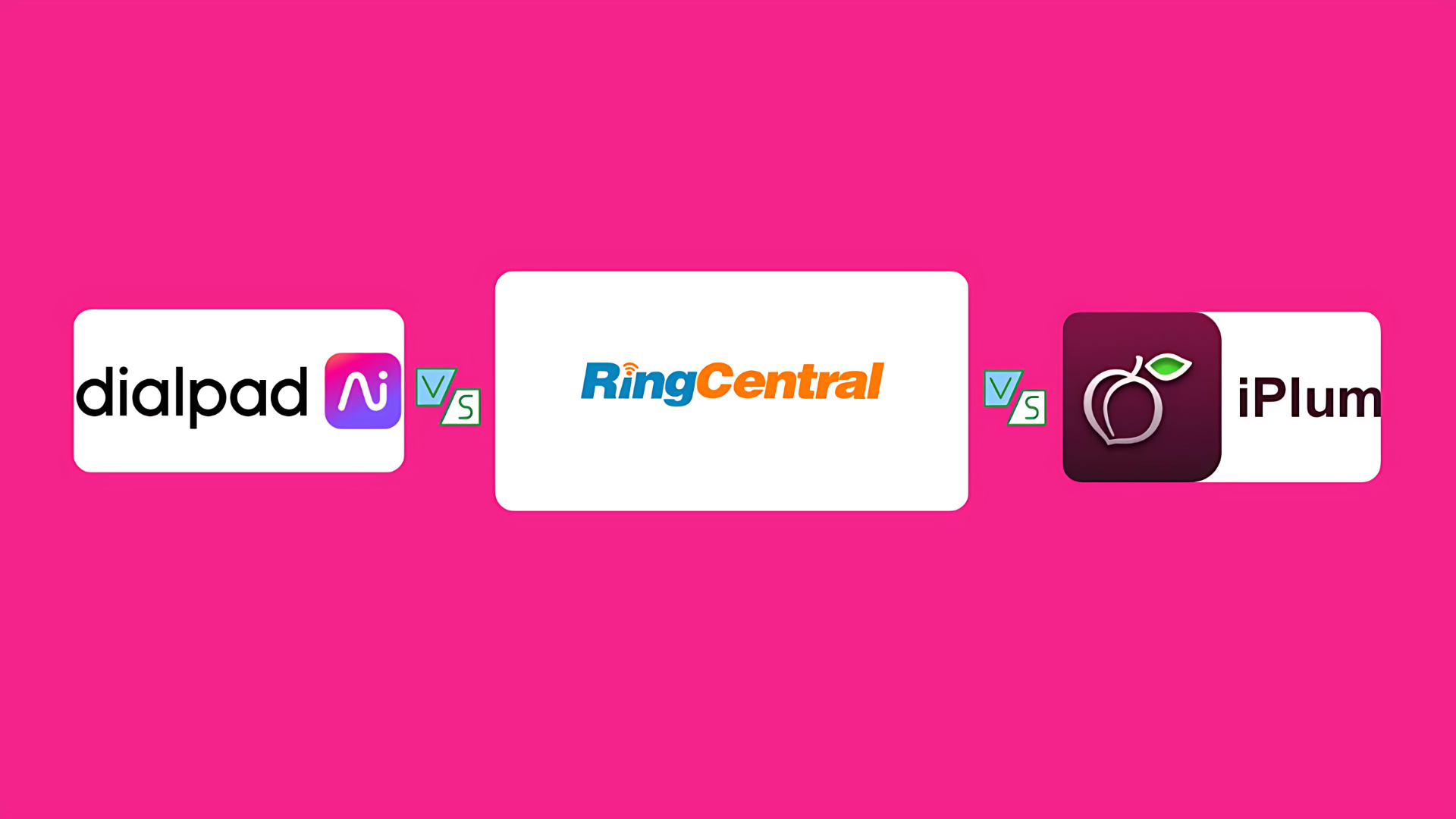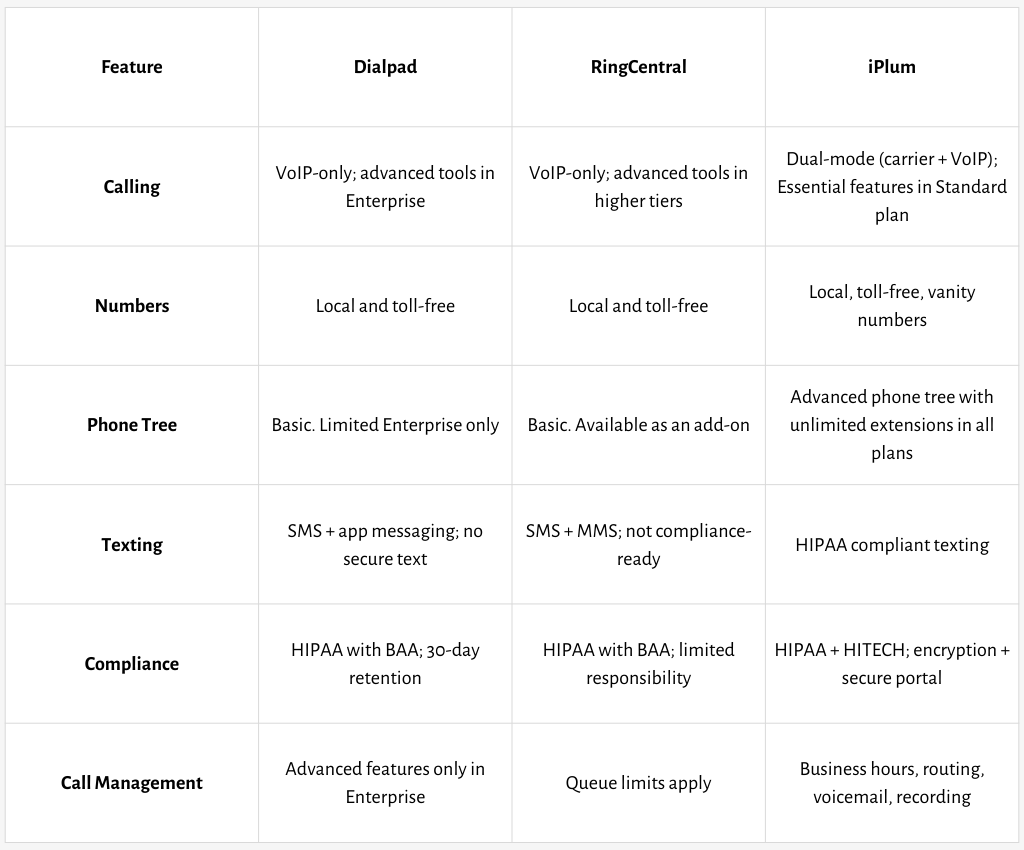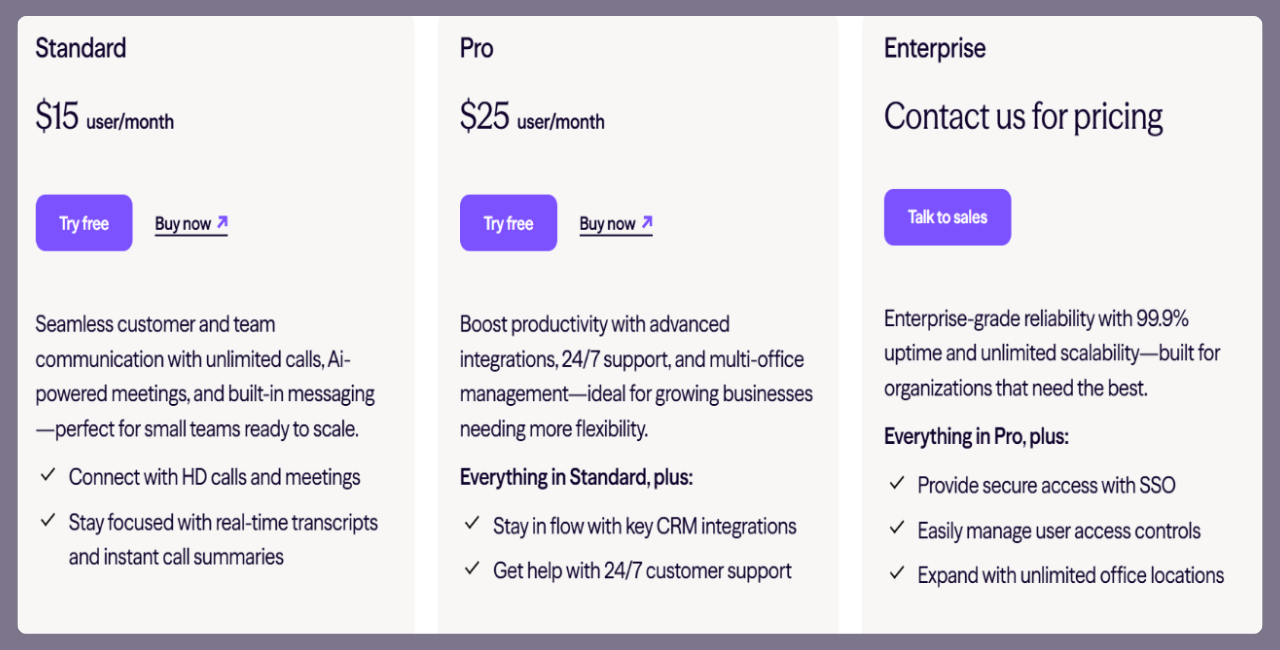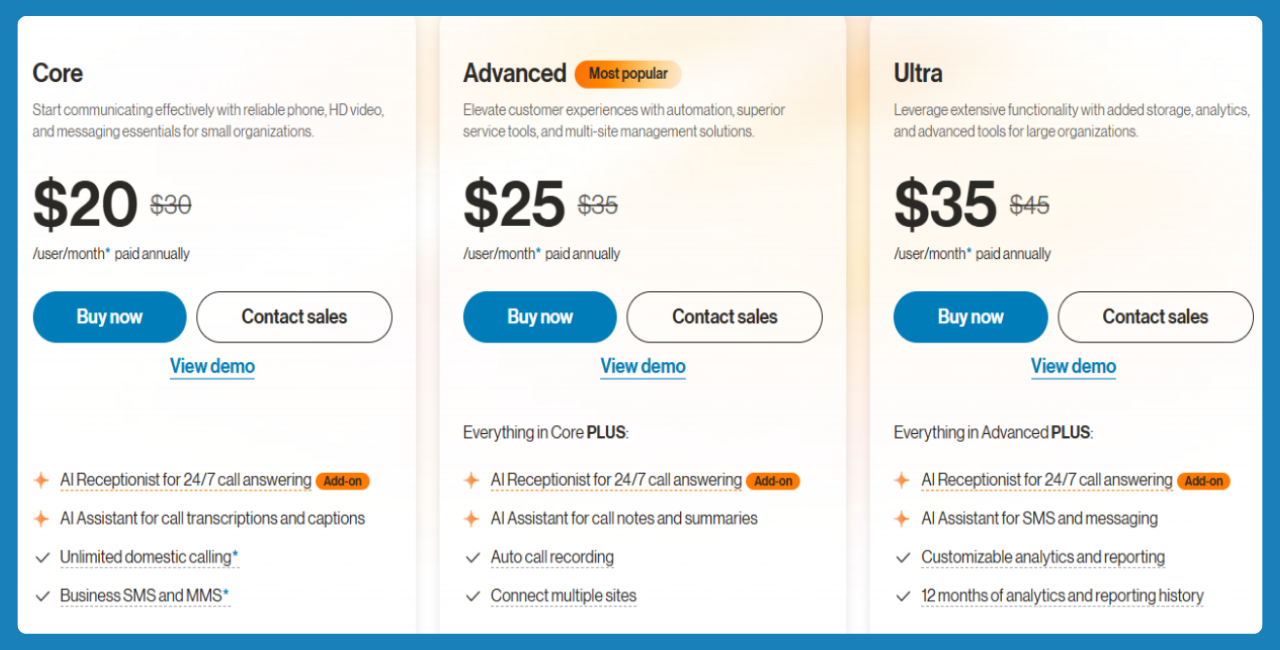
Dialpad says it helps you “elevate every conversation.”
RingCentral, meanwhile, positions itself as a leader in unified communications with voice, video, and messaging bundled together.
But, there’s a third option. It’s called iPlum, a robust phone system that offers better technology at a lower cost.
The thing is, Dialpad and RingCentral have drawbacks that can make them expensive or incomplete for small businesses.
Dialpad, for instance, doesn’t offer extensions unless you’re on the Enterprise plan, whose pricing isn’t publicly available.
RingCentral, on the other hand, offers limited storage for files, messages, and recordings unless you’re on the Ultra plan.
Apart from being affordable, iPlum doesn’t lock essential business communication features behind expensive tiers.
Plus, its Premium plan offers up to 1 year of call recording archiving alongside 50+ features.
Table of Contents
1. Dialpad vs RingCentral vs iPlum—A side-by-side comparison
2. Dialpad vs RingCentral vs iPlum—User Reviews
3. Dialpad vs RingCentral vs iPlum—Pricing
4. How to Port Your Number to iPlum
5. Dialpad vs RingCentral vs iPlum—Frequently Asked Questions (FAQs)
6. Why Choose iPlum Over Dialpad and RingCentral
Dialpad vs RingCentral vs iPlum—A side-by-side comparison
Let’s start by comparing the three platforms side by side so you can know the core capabilities of each.
Here’s a comparison table for a quick overview.

1. Phone Capabilities
Sure, your business phone system should make making and receiving calls easy. However, there’s more to a phone than calls.
You also want one with extras like call routing, voicemail, and web calling, among other features.
Here’s how the three platforms compare when it comes to phone capabilities.
Dialpad
Dialpad is a VoIP service whose phone features include call flip, analytics, and voicemail.
While Dialpad’s phone capability isn’t in doubt, it limits advanced tools such as extensions, multi-level call routing, and receptionist consoles to Enterprise plans.
Besides, being a VoIP service also means call quality can drop in weak internet conditions, leaving conversations less reliable in some situations.
RingCentral
RingCentral boasts call handling and a receptionist console designed for larger organizations.
It also offers workflow automation to streamline how you manage calls. But, just like Dialpad, most of these tools sit behind higher-priced plans, which makes it expensive for businesses on a tight budget.
Furthermore, with RingCentral, you need a strong internet connection to avoid call drops and audio issues.
iPlum
iPlum transforms your current smartphone into a business phone with a separate 2nd mobile line.
Furthermore, it offers dual-mode calling, so you can use carrier networks or internet data depending on conditions. Other features include voicemail transcription, spam blocking, call recording, and auto-text replies.
With iPlum, you get robust call management features at affordable rates, making it a cost-effective phone system with reliable functionality.
2. Phone Numbers and Toll-Free Options
Business communication begins by getting the right number.
Local numbers build trust in a community, while toll-free lines create a national presence and make it easier for customers to reach you.
Here’s what you get with the three platforms.
Dialpad
Dialpad offers local business numbers and toll-free rates at two cents per minute. Indeed, the pricing makes it attractive for startups that want a low-cost way to get toll-free access.
However, the platform doesn’t bundle toll-free minutes into its plans. As a result, usage costs can add up quickly if you’re handling high call volumes.
Dialpad, therefore, suits smaller companies that make fewer inbound toll-free calls.
RingCentral
RingCentral includes toll-free minutes in its plans, starting from 10,000 minutes. As a result, it can be a good pick for call-heavy organizations that want predictable monthly billing.
On the other hand, international number availability comes at a steep price.
Thus, budget-conscious businesses may find the cost prohibitive when trying to expand communication beyond the U.S. and Canada.
iPlum
iPlum provides local numbers in the U.S. and Canada, along with toll-free and vanity numbers for businesses that want a professional image.
In addition, you can port your existing number easily (check out a video guide in the sections below).
And, because iPlum works globally through its mobile app, entrepreneurs outside North America can still establish a U.S. or Canadian business presence. This makes iPlum a cost-effective option for international communication.
3. Phone tree, Auto Attendant, and Extensions
Your phone system should do more than connect calls. Your customers expect to reach the right department or person quickly, and auto attendants with extensions make even small businesses sound professional.
Let’s see how the three systems compare.
Dialpad
Dialpad offers call routing, but its options are significantly limited. In addition, multi-level auto attendants and extensions are only available on the Enterprise plan.
The ripple effect is that if you’re a small business or solopreneur, you’ll either overpay for features you rarely use or operate with limited routing tools.
And if you’re handling multiple departments, that gap can create unnecessary communication challenges.
RingCentral
RingCentral has an auto attendant and extensions. However, these features appear in higher-tier packages. For instance, you must purchase the AI receptionist as an add-on for a whopping $59 per account per month.
So, although powerful, this paywall makes RingCentral expensive for small businesses that only need simple call distribution.
iPlum
iPlum offers a full-featured auto attendant with unlimited extensions, which are available even on the Standard plan.
The phone tree lets you route calls to iPlum numbers or to external landlines and mobile numbers.
As a solo professional, you can configure a simple menu such as “Press 1 for Sales, Press 2 for Support.” Meanwhile, larger businesses can create multiple extensions to different locations or teams worldwide.
The bottom line is that iPlum’s phone tree gives small organizations the same professional call routing structure that larger enterprises use without the high cost.
4. Business Texting
Texting has become a standard way for businesses to interact with customers.
From appointment reminders to quick updates, messaging offers speed and convenience that sometimes supersedes calls or emails.
How do Dialpad, RingCentral, and iPlum compare here? Let’s find out.
Dialpad
Dialpad provides SMS and a built-in messaging platform. The system allows you to sync conversations across devices and move between desktop and mobile apps. However, Dialpad doesn’t offer a secure channel to relay sensitive information via text.
RingCentral
RingCentral includes SMS and MMS on its plans. You can use the platform to text clients or colleagues from the same app you use for calls
However, the service is not designed for compliance-driven messaging. So, if you need secure, encrypted texting for patients or clients, you must look elsewhere.
iPlum
iPlum offers HIPAA-ready texting with AES-256 encryption. With iPlum, you can send secure messages, share attachments, and even give clients access through a free web portal.
The platform also offers broadcast messaging, group texts, auto-replies, and text archiving. These features allow you to run professional, compliant communication directly from a mobile phone or web portal.
5. Compliance and Privacy
Businesses in healthcare, legal, and finance must follow strict privacy rules. Therefore, choosing a phone system that lacks compliance features can expose sensitive data and create costly regulatory risks.
Here’s what you get with the three services.
Dialpad
Dialpad says it can be HIPAA-compliant but only if healthcare providers sign a Business Associate Agreement (BAA).
The platform also uses Google Cloud, SOC 2 audits, access management, and encryption. However, retention rules are strict—its BAA defaults to 30 days for recordings unless extended. For healthcare, that short retention window may not match operational needs.
RingCentral
RingCentral offers HIPAA compliance when you request and sign a BAA.
Once in place, RingCentral acts as a Business Associate and manages its obligations under HIPAA. However, the customer remains responsible for overall compliance.
iPlum
iPlum is HIPAA and HITECH compliant. It also comes with a signed BAA. Furthermore, iPlum uses AES-256 encryption for calls, texts, and stored data, ensuring full protection of client information.
In addition, iPlum provides a free account for clients or patients, allowing them to communicate through secure, bidirectional texting.
Unlike standard SMS or MMS, these exchanges meet HIPAA requirements because data remains encrypted and protected.
Dialpad and RingCentral don’t offer this level of compliance for client-facing communication.
6. Business Hours and Call Management
Businesses need control over when calls and messages come through.
And a good phone system should route calls appropriately, filter unwanted traffic, and protect work-life balance.
Here’s what you get with the three platforms.
Dialpad
Dialpad allows admins to set business hours for main lines, departments, and contact centers.
In addition, you can create split schedules, adjust days of operation, and define personal working hours for users.
However, the more advanced configurations, such as multi-level routing tied to hours, are only available in the Enterprise plan.
RingCentral
RingCentral, like Dialpad, enables admins to set company business hours in the auto-receptionist and define open or closed routing.
However, queues cap wait time at 15 minutes and the waiting list at 25 callers, which can constrain high-volume lines.
Furthermore, configuration spans auto-receptionist, user rules, custom rules, and queues, so admins must work in multiple dashboards to apply changes.
iPlum
iPlum offers business hours scheduling, do-not-disturb options, and custom voicemail greetings. You can route calls outside working hours automatically to voicemail, reducing interruptions.
The system also allows users to set forwarding extensions that ring multiple numbers, even international lines, during business hours.
In addition, it delivers voicemail transcriptions by email for quick review, and call recording with consent for compliance.
Together, these features give small businesses enterprise-level control over availability at a fraction of the cost of Dialpad and RingCentral.
Dialpad vs RingCentral vs iPlum—User Reviews
Before choosing a business phone system, it’s worth hearing from those already using it. Customer reviews often reveal what product pages don’t and how the service performs day to day.
Dialpad reviews
Most users like Dialpad’s feature set and UI, but several complain about reliability, support, and missing integrations.
❌ Support issues
"Support team... difficult to get issues addressed and resolved." – KC, Capterra.
❌ Sending pictures via text fails
"Pictures aren't always received by the recipient, even though they show as sent." – Elisabeth L., Capterra.
❌ Occasional app freezes
"Dialpad applications will sometimes freeze up, requiring you to manually close the application and restart it to resolve the issue." – Matthew B., Capterra.
✔ Easy to use and intuitive UI
"The setup was quick and easy... each department in my company can have its own line." – Matt B., Capterra.
RingCentral reviews
Most customers generally love RingCentral for its feature depth and reliability, but some mention slow support responsiveness, pricing complexity, and billing.
❌ Poor customer service and billing issues
"Customer support is lacking. Unable to add lines or get help without waiting days." – Trustpilot reviewer
❌ Setup takes too long
"The setup for the account takes so many hours that in our case, it delayed going live." – Cassandra G., Capterra
❌ Wait queue limits
"Queues cap wait time at 15 minutes and the waiting list at 25 callers, which can constrain high-volume lines." – Albert S., Capterra
✔ Strong forwarding and voicemail features
"I love the call forwarding ability to transfer calls to colleagues, as well as being able to set office hours and voicemail, etc." – Robert L., Capterra
iPlum reviews
Most users describe iPlum as reliable, affordable, and uniquely well-suited for healthcare and small business communication.
A few mention setup problems, but also acknowledge Plum's responsive support.
✔ Easy setup & use
"I love that iPlum was easy to set up and to use on a regular basis." – Kelly M., G2
✔ HIPAA-compliant texting & affordable
"Exactly what I needed! … functionality at a good price point … (a HIPAA-compliant method to communicate with my therapy clients)." – Kelly M., G2
✔ Second line on one phone
"Being able to use only one phone! … For years I’ve had to carry around two phones … Things feel so much more streamlined now." – Verified User, G2
❌ Account setup issue (resolved quickly)
"I had some difficulty setting up the account, but support responded promptly and walked me through everything." – Larry S., G2
Dialpad vs RingCentral vs iPlum—Pricing
How much a phone system costs enables you to decide whether it is worth purchasing. Let's compare the three platforms side by side.
How much does Dialpad cost?

Dialpad offers three subscription tiers that scale with business size and needs:
Standard — $15 per user per month
This plan offers unlimited U.S. and Canada calling, voicemail, HD voice quality, call forwarding, and basic call routing features.
Pro — $25 per user per month (minimum of 3 users)
Adds to Standard with ring groups, hold queues, call recording, and integrations with platforms like Salesforce and Google Workspace.
Enterprise — Custom pricing (minimum of 100 users)
Built for large organizations, this plan unlocks unlimited ring groups, extensions, executive assistant features, advanced security tools, and priority support.
How much does RingCentral cost?

RingCentral structures its pricing in three tiers:
Core — $20 per user per month
Provides unlimited U.S. calling, SMS/MMS, IVR menus, shared voicemail, and video meetings with up to 100 participants.
Advanced — $25 per user per month
Adds automatic call recording and online fax to everything in Core, giving businesses more communication tools.
Ultra — $35 per user per month
Expands the package with custom analytics, 12 months of reporting history, and video meetings that support up to 200 participants.
How much does iPlum cost?

iPlum ranges from $8.99 to $19.99 per user per month, depending on the plan you choose:
Standard — $8.99 per user per month
Offer calling and texting through the mobile app in the U.S. and Canada.
Features include voicemail, auto-replies, business hours scheduling, and a phone tree for professional call routing.
Professional — $14.99 per user per month
Expands Standard with web-based calling and texting, secure, encrypted messaging, voicemail transcription, and HIPAA compliance with a BAA.
Group messaging, broadcast texts, and archiving are also available.
Premium — $19.99 per user per month
Adds call recording and extended compliance options for industries such as finance, insurance, legal, and healthcare.
This plan builds on Professional to provide a full set of business-grade communication tools.
Dialpad vs RingCentral vs iPlum Pricing—Which offers more value
iPlum’s Standard plan at $8.99 is 40% cheaper than Dialpad’s $15 plan and 55% cheaper than RingCentral’s $20 Core.
Again, at the mid-tier, iPlum Professional, at $14.99, is 40% cheaper than Dialpad Pro and RingCentral Advanced, at $25.
Meanwhile, at the top, iPlum Premium at $19.99 is 20% cheaper than Dialpad Enterprise (custom, over $25) and 43% cheaper than RingCentral Ultra at $35.
All while providing features like compliance, call recording, and auto-attendant features that the others lock behind higher prices, making it the cheaper, feature-rich choice.
How to Port Your Number to iPlum
You can transfer your existing Dialpad or RingCentral number to iPlum by simply following the instructions in the video below.
Dialpad vs RingCentral vs iPlum—Frequently Asked Questions (FAQs)
What are the benefits of Dialpad?
Dialpad offers VoIP calling, voicemail, call analytics, and device syncing. However, it relies entirely on the internet, meaning weak connections can affect call quality and reliability.
What is an iPlum number?
An iPlum number is a second business line for your smartphone. It works on U.S., Canada, or toll-free numbers and supports carrier or internet calling with compliance features.
Who is RingCentral's biggest competitor?
There are many RingCentral competitors. However, iPlum is the best RingCentral alternative if you’re looking for true HIPAA compliance and dual mode reliability.
Why Choose iPlum Over Dialpad and RingCentral
Dialpad and RingCentral have earned a strong reputation over the years.
However, one is expensive with hidden costs in higher plans, while the other overwhelms smaller businesses with complex bundles and features they may never use.
iPlum offers a perfect middle ground.
On one hand, it gives small businesses affordable pricing that starts at $8.99 per user per month for essentials like voicemail, call routing, and business hours.
On the other hand, it delivers enterprise-grade features such as HIPAA-compliant texting, dual-mode calling, call recording, and unlimited extensions without draining your budget.
Click the link below to get started with iPlum.
Disclaimer: This article is intended for general informational purposes and may not reflect the most current features or capabilities of the products or companies mentioned. For the most accurate and up-to-date information, please refer to the official sources of each company.



%20(1).avif)
.avif)

